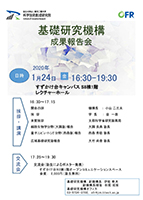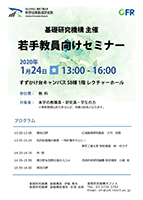2018.7~2019 News
2020-2-21
The 5th meeting of the Specialized Academy for Cell Science
The 5th meeting of the Specialized Academy for Cell Science, entitled “How can we survive?” was delivered by Prof. Hiroshi Kimura (Cell Biology Center, Institute of Innovative Research) on February 21st.
Title: How can we survive?
Speaker: Prof. Kimura
At the beginning of the meeting, Toshiaki Fukushima (Assistant Professor) and Takahisa Maki (Assistant Professor) gave reports on their sabbatical trips and activities abroad.
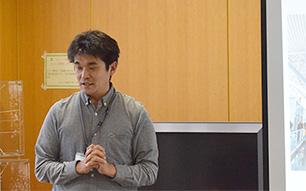
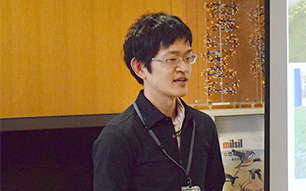
Next, Prof. Kimura of the Cell Biology Center gave a talk entitled "How can we survive?". He talked about his postdoctoral life in UK and his experiences after returning to Japan, including his work at various research institutes before coming to Tokyo Tech. In particular, he talked in detail about each decision he made in determining his career, describing his motivations and worries as well as key factors in his decision-making process. He stressed that studying abroad is invariably a useful experience for a researcher, and that it is essential to live a well-balanced life, neither underestimating yourself nor being arrogant. He also talked about his attitude and approach to job hunting. The talk was very stimulating to the young researchers who participated in the meeting.
After the meeting, dozens of academy scholars and post-doctoral fellows from the Cell Biology Center participated for a social gathering, where they exchanged opinions on topics including research and studying abroad.
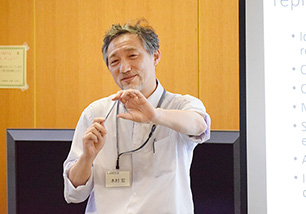
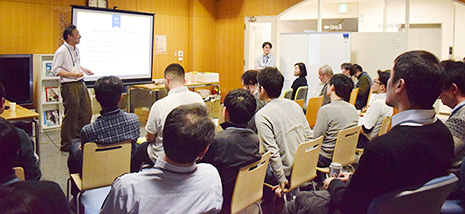
2020-1-30
Tokyo Tech News: Autophagy preferentially degrades liquid droplet proteins, but not aggregates
The work of Specially Appointed Assistant Professor Akinori Yamasaki, who is an academy scholar in the Specialized Academy for Cell Science of the of Organization for Fundamental Research, has been featured in the Tokyo Tech News magazine. The key points of the article are:
- - While it is thought that selective autophagy degrades pathological aggregated proteins, thereby protecting us from diseases, it has remained unclear whether aggregation alone is a precondition for degradation, or whether other protein forms including liquid droplets can also be targeted by selective autophagy.
- - Dr. Yamasaki’s work revealed the efficient degradation of a liquid droplet protein by selective autophagy.
- - This work suggests that the development of drugs that convert protein aggregates into a liquid droplet form may offer a new clinical strategy in the prevention and treatment of neurodegenerative diseases.
For further details, see the article in Tokyo Tech News.
2020-1-24
Annual Research Report Conference
The Organization for Fundamental Research (ORF) was established by the Tokyo Institute of Technology (Tokyo Tech) to nurture young researchers who will be responsible for the pioneering science and technologies of tomorrow. Dr. Fumio Koyama, Director of the ORF, presided over the annual research report conference, which was followed by an exchange event, on January 24, 2019 at the Building S8 Lecture Hall, Suzukakedai Campus. The event was attended by more than 110 people, including guests of honor Mr. Yoshinori Murata, Director General of the Research Promotion Bureau of the Ministry of Education, Culture, Sports, Science and Technology (MEXT), and Mr. Tadatoshi Kaneko, Director of the Office of Basic Research Promotion, Research Promotion Bureau, MEXT. In addition, Dr. Kazuya Masu, President of Tokyo Tech, and other university officials were in attendance. The CFR has enabled the formation of two specialized Academies, one each in the cutting-edge fields of cell science (led by Dr. Yoshinori Ohsumi) and quantum computing (led by Dr. Hidetoshi Nishimori), as well as the Comprehensive Academy (led by Dr. Naoto Ohtake), where new assistant professors from diverse backgrounds are able to study for three months.
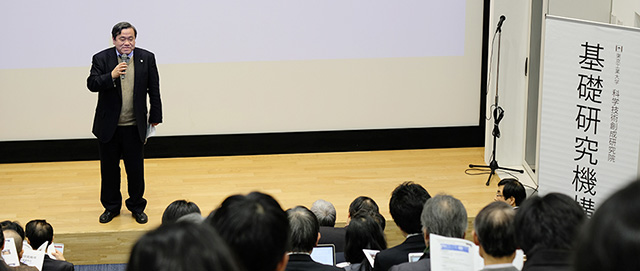
The debriefing session
The debriefing session began with a greeting from Director Koyama, followed by some words of encouragement from President Masu to CFR academy members.
- Dr. Kazuya Masu, President, Tokyo Tech
Nowadays, the research environment at universities is very different from when I started out as a researcher, and it is becoming harder to devote time to research. One of our key university management strategies is to create an environment in which young researchers can maximize the amount of time they spend on research. I want you all to make the most of that time, and also to have many opportunities to interact and communicate with and a wide variety of people. I would like to ask that all of you make the most of our commitment to a better research environment and develop into innovative scientists that form the foundation of Japanese basic research into the future.
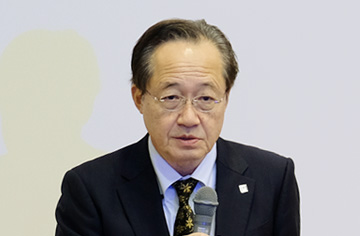
President Masu delivering his speech
Following this speech, the guest of honor representing MEXT, Mr. Murata, gave a congratulatory speech.
- Mr. Yoshinori Murata, Director-General, Research Promotion Bureau, MEXT
I have heard that CFR was established in 2016, the same year that Dr. Yoshinori Ohsumi was awarded the Nobel Prize. This carefully thought through program was formed with the objective of providing maximum support for young researchers, providing an excellent environment to take on new challenges. Dr. Ohsumi and Dr. Hidetoshi Nishimori, who are at the forefront of their fields of research, lead Specialized Academies that provide generous support for young researchers. In addition, the Comprehensive Academy, headed by Prof. Naoto Ohtake, promises unanticipated benefits by encouraging debate and the friendly rivalry between junior faculty members from diverse, specialized fields.
The word “juku” (academy in Japanese) reminds me of “Tekijuku,” an academy established by Ogata Koan, “KeioGijuku,” founded by Fukuzawa Yukichi, and “Shokasonjuku,” which was taught by Yoshida Shoin. The fact that these famous institutions, which gave us such outstanding talents, inspired the formation of this academy shows the enthusiasm and commitment of Tokyo Tech to this organization. The government considers the development of young researchers to be a very important task, and MEXT has written the new “Emergent Research Support Program” into the FY2019 supplementary budget. We hope that our efforts and this program will lead to the fostering of young researchers who will be the creators of future innovation.
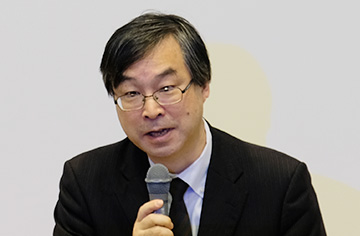
Mr. Murata giving his speech
Next, the three headmasters, Dr. Yoshinori Ohsumi (Speciallized Academy of Cell Science), Dr. Hidetoshi Nishimori (Speciallized Academy of Quantum Computing), and Dr. Naoto Ohtake (Comprehensive Academy), gave an overview of the annual activities of each Academy.
- Dr. Yoshinori Ohsumi, Headmaster, Specialized Academy of Cell Science.
I feel that two things are still not fully understood in Japan at the present time. First, a university should be an environment that allows for broad interaction and research activity, and that an environment where researchers can enjoy their research is crucial.
There are four activities of this year’s Academy that we will carry on into next year’s program:
- 1. Special Talks: During these sessions, senior faculty members deliver talks to young researchers and graduate students. We held five of these events this year.
- 2. Colloquia: Lecturers from domestic research institutes and abroad were invited to introduce their latest research results. This year, we hosted 11 lecturers in this program.
- Research funding: Financial support for the overseas activities of the academy members, enhancing the exchange of ideas.
- Development and expansion of laboratories and core facilities hosting capital intensive experimental equipment for academy members and graduate students.
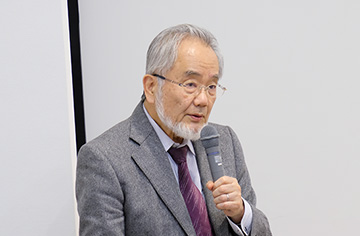
Dr. Yoshinori Ohsumi
- Dr. Hidetoshi Nishimori, Headmaster, Specialized Academy of Quantum Computing.
Quantum annealing started with a dissertation in our lab 22 years ago, followed by innovations in North America and a big push towards industrialization. Google has since created its own machine for quantum annealing, strategically applied it to practical problems, and successfully implemented the quantum gate method.
As a purely theoretical discipline, two types of activity will be offered in our Academy this year, as for last year:
- 1. Seminars: A wide range of researchers, including domestic and international business people, are invited to present on topics ranging from basic research to the industrial applications of relevant technologies. We invited 11 speakers this year.
- 2. Research funding: Two members used funds to conduct research overseas and reported their findings of their work upon return.
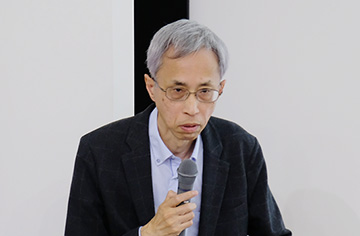
Dr. Hidetoshi Nishimori
- Dr. Naoto Ohtake, Headmaster, Comprehensive Academy
Our initial application to MEXT proposing the concept of CFR only outlined our strategy to implement the Specialized Academies. We received feedback that it would be valuable to also have an academy for young researchers, irrespective of affiliation, at Tokyo Tech. This stimulated us to form the Comprehensive Academy. We decided to limit eligibility to newly recruited assistant professors due to concerns about the effect of the program on teaching and research if all were included. This year, 29 members were selected to participate in the Comprehensive Academy, allowing increased research effort throughout the program duration of three months. The Academy comprises several activities: an orientation, in which students are encouraged to think deeply about their research, a Research Field Introduction meeting, where members introduce themselves and their work to each other, thereby facilitating interaction between and understanding of different fields, a workshop that allows participants to step back and assess the relationship between their work and society from a broader social perspective, and the Research Theme Development meeting, where members give in-depth talks describing their research. We further conducted interviews of members to determine whether this program had any effect on the amount of time members are able to devote to research, as well as any changes in their research environment caused by the Comprehensive Academy. We also held a special lecture by Dr. Ohsumi, during which Dr. Ohsumi gave a brief overview of his research career that was followed by a casual discussion section where Academy members were able to freely converse with this eminent and successful scientist. Due to the success of the program and the numerous exciting research proposals arising, the university immediately set up the New Research Challenge Incentive Fund, which members of the Academy were invited to apply for. An anonymous survey provided us with a participant feedback upon completion of the first year of this program. Although the feedback was generally positive, we also received some valuable ideas regarding how to improve the Academy in the future, which we have taken on board and will use to further refine this promising program. The key issues identified were to clarify the training sessions, ensure that the program is provided with long-term funding, and enhance relationships between the Academy and other organizations. I would like to conclude by congratulating the 29 members on their effort and commitment to this year's program. We are very proud of the excellent and promising young scholars who participated.
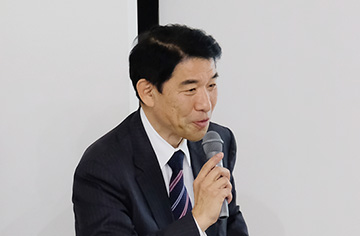
Dr. Naoto Ohtake
The conference ended with a speech by Dr. Norio Inou, Associate Director of the Organization, and was followed by a relaxed networking event at the Open Communication Space on the 1st floor of Building R2, Suzukakedai Campus. Nearly 80 participants joined in this session and exchanged their opinions on the future of CFR and Tokyo Tech. In addition, we also held a poster presentation session, where 47 posters from all members of the Specialized and Comprehensive Academies were displayed and enthusiastic academic discussions were held.
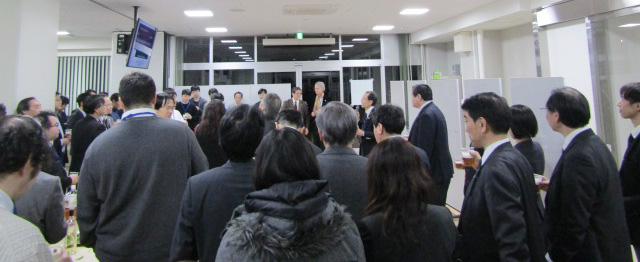
An overview of the exchange party
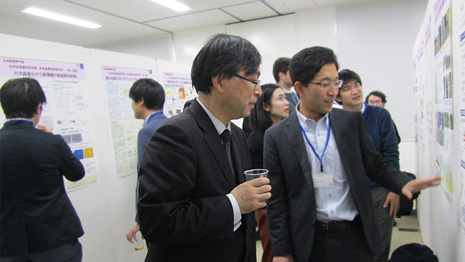
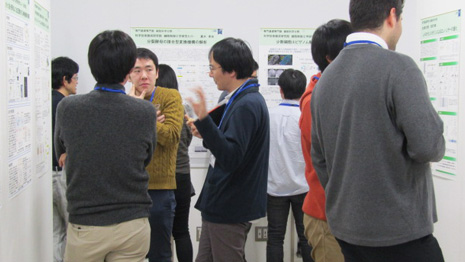
Participants discussing their posters at the networking event.
2020-1-24
The Comprehensive Academy Holds a Seminar for Junior Faculty Members.
The Organization for Fundamental Research held a seminar for junior faculty members on Friday, January 24, 2020 from 1:00 pm to 4:00 pm in the lecture hall of Building S8, Suzukakedai Campus, as part the Comprehensive Academy program, which aims train and nurture the next generation of researchers at this critical stage in their development as top-level international scholars. We invited two excellent speakers from within and outside the university to give important guidance to our young researchers as they prepare for a career in research. For this event, we decided to focus on the important area of intellectual property law the internationalization of research. We opened the meeting to not only the members of the Comprehensive Academy Class of 2019, but also to members of the Specialized Academies, other junior faculty members, young researchers, and graduate students of the University.
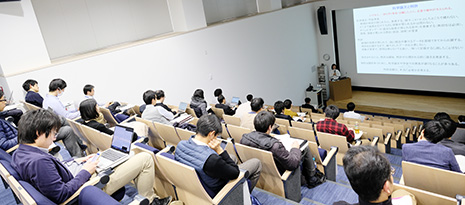
The lecture room
- Fundamentals of Intellectual Property Rights: the Role of Patents and Copyright in Research.
Dr. Yuko Hayashi, Specially Appointed Prof., Tokyo Institute of Technology
After graduating from the Department of Chemistry in the Faculty of Science and the Graduate School of Science and Engineering of Tokyo Tech, Dr. Hayashi worked as a corporate researcher and a faculty member of Tokyo Tech. After moving to the Industry Liaison Office of Tokyo Tech as a coordinator, she has made great achievements over the years facilitating the acquisition of intellectual property rights and in the transfer of technologies to industry. She is currently working as a specially appointed professor in the Office of Research and Innovation at our university. In this talk, Dr. Hayashi gave an excellent and accessible overview of intellectual property rights, defining relevant terms and highlighting important points to help researchers understand this complex field. Dr. Hayashi provided interesting examples of the relevance of patent rights and copyright that provided a solid foundation for early career researchers.
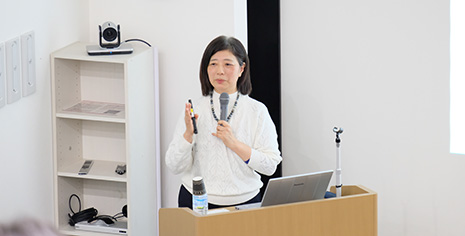
Dr. Hayashi presenting on intellectual property.
- Encouraging Interdisciplinary and International Collaboration at Universities
Dr. Amane Koizumi, Specially Appointed Prof., National Institute of Natural Sciences
After graduating from Keio University School of Medicine, Dr. Koizumi became an assistant in the Department of Physiology at Keio University School of Medicine, and then studied at Harvard Medical School before becoming an associate professor at the National Institute for Physiological Sciences (NINS). After serving as an academic researcher at the Ministry of Education, Culture, Sports, Science and Technology (MEXT) and a science communication fellow at Japan Science and Technology Agency (JST), he has been active in a number of government policy subcommittees as a specially appointed professor and University Research Administrator (URA) director at the National Institute of Natural Sciences (NINS), including the development of methods for analyzing the research capacity of universities and analysis of the social impact of research. In his lecture, he covered a broad range of topics concerning the development of research Japan, including his thoughts on the internationalization of universities, research output, and essential skills for developing researchers. He also described his own experiences in facilitating interdisciplinary research and international collaboration.
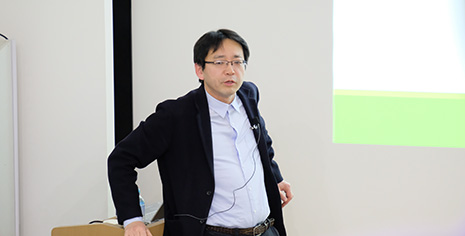
Dr. Koizumi delivering his talk
2019-12-12
Annual Research Report Conference and Seminar for Junior Faculty
The Annual Research Report Conference of the Organization for Fundamental Research, where researchers outline the progress of their research, will be held on Friday, March 24 at the Lecture Hall of Building S8, Suzukakedai Campus. In addition, a seminar for junior faculty members will be held before the debriefing session, hosted by the Comprehensive Academy of the CFR.
- 13:00-16:00 Seminar for junior faculty
- 16:30-17:15 Presentation of the annual research reports from Academies members
- 17:25-19:30 Exchange session and poster presentation by members of Academies
2019-12-03
Appointment of New Academy Scholar
Dr. Kentaro Ito was inducted as an academy scholar into the Specialized Academy for Cell Science of the Organization for Fundamental Research on the 1st of December. Dr. Ito received his certification of induction from Academy Head Yoshinori Ohsumi and Organization Director Fumio Koyama.

2019-11-25
Final Presentation of 2019 Second-Term Comprehensive Academy Member Research Projects.
Twelve academy members participating in the second-term comprehensive academy program delivered reflective talks on the impact of the academy on their research on at the Suzukakedai Campus on November 25, 2019, from 9:30 a.m. to 12:30 p.m. in Conference Room No. 5, Building S2 or November 29, 2019, from 9:30 a.m. to 12:00 p.m. in Conference Room No. 6, Building S2. Two first-term academy members that were unable to attend the previous meeting on August 6 also presented at this meeting. Each academy member gave a 10-minute presentation on the research concepts developed during the academy program, and a 10-minute Q & A session followed each presentation. Members were instructed to make their talks as easy to understand for those who were not familiar with their particular specialty. Most presenters described how they had developed on ideas that they formulated during Academy activities, such as those inspired by other members’ research outlined at the "Research Project Introduction" session, those taking on a future-oriented perspective drawing on discussions at the "Connecting Your Research with Tomorrow’s Society" session, and those stimulated by Dr. Ohsumi's advice at the Special Lecture session. The 70 questions posed during the Q & A session largely reflected the mutual interests developed during the program, and the presenters’ responses showed additional depth and clarity following the three months of reflection and idea exchange. It was clear from the engagement of participants that a strong enthusiasm for integrating different disciplines and proactively adopting new ideas was a key outcome of the comprehensive academy. We hope that the research plans of each academy member will be further refined through discussions with colleagues in their respective fields of expertise, and will come to fruition through collaboration with scientists from diverse backgrounds. After the presentation, a certificate awarding ceremony was held to mark the completion of the formal element of the second-term program. On January 24 in 2020, an additional meeting will be held, where the academy member who was unable to attend this session will present his reflections on the comprehensive academy and its contribution to his research work.
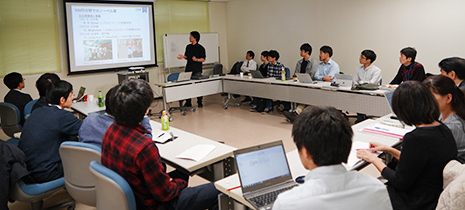
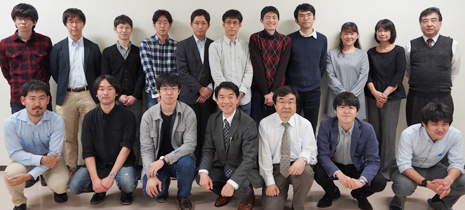
2019-11-11
Tokyo Tech News: Discovery of a key role for "jumping DNA" in the evolution of the mammary gland
Research by Assistant Professor Hidenori Nishihara (Specialized Academy for Cell Science) was featured in Tokyo Tech News. The paper revealed that:
- - Many of the regulatory sequences for mammary gland formation are derived from "jumping DNA," such as retrotransposons.
- - Retrotransposons amplified enhancer source sequences throughout mammalian evolution
The paper represents major progress toward understanding how the mechanism of mammary gland formation evolved. For more information, please visit the Tokyo Tech News website at https://www.titech.ac.jp/english/news/2019/045702.html
2019-10-28
The 4th meeting of the Specialized Academy for Cell Science
The 4th meeting of the Specialized Academy for Cell Science was held on October 28th.
Title: Once upon a time in the lab
Speaker: Prof. Hiroshi Kimura (Cell Biology Center, Institute of Innovative Research)
At the 4th meeting, Prof. Hiroshi Kimura of the Cell Biology Center delivered a talk entitled "Once upon a time in the lab". Prof. Kimura shared his experiences that led him to become a scientist, describing his early days starting out as a researcher, first as an undergraduate student at Hokkaido University, and then his postdoctoral life at Oxford University. His witty commentary was very entertaining and enlightening. He touched on important topics, including how to maintain motivation and make good decisions when research is not progressing well, which were particularly helpful for current graduate students and young researchers battling information overload in this era of rapid change. I feel that his thoughts about how results and effort should be evaluated are also reflected in the education and management of students in his lab. While not discussed in this lecture, attendees look forward to hearing Prof. Kimura’s experiences in the latter half of his career as an independent researcher, especially his thoughts on how to survive the tenure track process. Following the talk, over 50 staff and students from the Cell Biology Center enjoyed a very sucessful exchange meeting.

2019-10-23
“Connecting Your Research with Tomorrow’s Society" workshop held for the Second-term 2019 Comprehensive Academy Members.
The “Connecting Your Research with Tomorrow’s Society" workshop was held on Wednesday, October 23, 2019, from 1:30 p.m. to 5:30 p.m., on the 4th floor of the Centennial Hall, Ookayama Campus, in collaboration with the Laboratory for Design of Social Innovation in Global Networks (D-Lab) and the Organization for Fundamental Research. This workshop aims to provide second-term academy members with an opportunity to step back and conduct a broad overview of their research project, thereby encouraging a new awareness of the connection between their research and the future needs of society. Academy members discussed the impact that research can have on society in the future by considering a series of future scenarios. The session enhanced the ability of participants to incorporate a macroscopic perspective when thinking about research while also enhancing collaboration and communication skills.
The workshop commenced with opening remarks delivered by Dr. Watanabe, Executive Director and Vice-President of the University. Prof. Ohtake, Headmaster of the Comprehensive Academy, then explained the significance and broad objectives of the workshop, and Dr. Hajime Nitta of D-Lab gave a detailed introduction to the workshop program. The 13 participating academy members were divided into three groups, and each participant was invited to come up with and share three appealing potential future scenarios. The group then discussed these contributions, eventually narrowing down to a single idea – a product or service – that offers an exciting imagining of the possibilities of the future. A representative from each group introduced these ideas in a presentation session, which was followed by discussion. Next, groups identified the science and technology elements necessary to realize their ideas, accounting for the causal relationships between these factors and time. They also discussed the social context necessary for the realization of their ideas and discussed their potential impact on society. Finally, representatives of each group presented detailed summary of the topics, followed by a question and answer session and exchange of opinions. After the meeting, each member prepared a research proposal describing ideas identified in the session, and also wrote a report on the workshop that was submitted a week later.
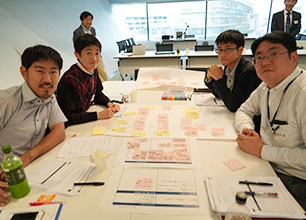
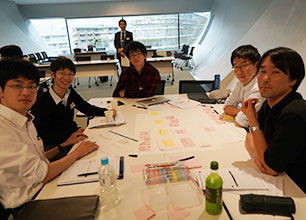
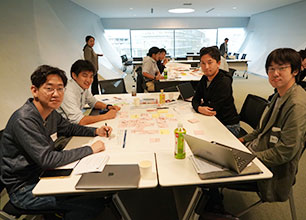
As for the previous workshop for first-term academy members held last July, members were not been informed of the workshop content until the day, and some were initially challenged by the structure of the session. However, as the discussion begun and interesting ideas were exchanged, the tone of the session became remarkably positive. During the final presentation session, the Q & A session was lively and participants engaged in a robust exchange of ideas, as we have come to expect of academy members. A social event followed the workshop, where participants got to know each other in a more casual but equally engaging setting.
2019-10-16
Researcher Presentations for the Second-term Comprehensive Academy Class of 2019.
On October 16, 2019, from 10:00 a.m. to 3:00 p.m., 11 of the 13 second term academy members from the class of 2019 were invited to give presentations on their research in the 5th meeting room of the S2 building, Suzukakedai Campus. In this session, each academy member gave a 7-minute presentation about their past research to the interdisciplinary membership of the academy, followed by a 12-minute question-and-answer session, to deepen communication and learn about each other's research. Interdisciplinary communication is difficult for speakers as it can be challenging to introduce research interests and opinions to a non-specialist audience. The audience, too, must engage with and understand the speaker's thoughts and specialist knowledge before they are able to voice an opinion about the work Thanks to the careful preparation of speakers and engagement of all members as an audience, a total of 52 questions and answers were actively debated, and members were able to share their valuable experiences, often from a unique and valuable perspective, with each other. Two members who were unable to attend this meeting will present both their recent work and introduce their research at a separate presentation session to be held in late November.
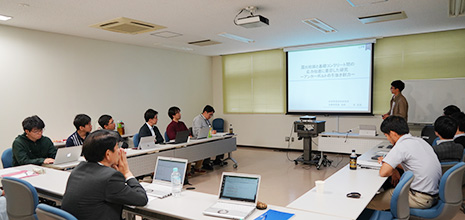
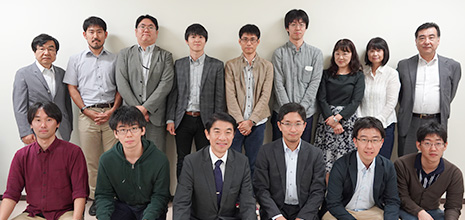
2019-10-3
Tokyo Tech News: Discovery of critical histone modifications that trigger zygotic genome awakening
Research by Assistant Professor Yuko Sato of the Specialized Academy for Cell Science was featured in Tokyo Tech News. The work was summarized in the article, which described that
- - Changes in transcriptional activation and histone modification were tracked in live embryos during development.
- - Histone H3 Lys27 acetylation plays an important role in the initial transcription from the embryonic genome.
For more information, please visit the Tokyo Tech News website at (https://www.titech.ac.jp/english/news/2019/045378.html).
2019-9-26,27
Orientation for the Comprehensive Academy’s Second-term Class of 2019
Orientation sessions for second-term academy members of the class of 2019 were held on September 26, 2019 at the 5th meeting room, Building S2, Suzukakedai Campus, and on the following day in Room 629, Building W9, Ookayama Campus. Of the 13 academy members, eight attended the Suzukakedai session and three attended the Ookayama session, where they were awarded their induction certificates. The remaining two members were unable to attend the orientation and attended one-on-one orientations the following week, where they also received induction certificates. The orientation program included the following:
- ・Self-introductions by the staff of the academy
- ・An explanation of the agenda by Associate Director Ino
- ・An outline of the purpose and activities of the Comprehensive Academy by Headmaster Ohtake
- ・A self-introduction session for all academy members
- ・The presentation of admission certificates by Headmaster Ohtake
- ・Signing of a pledge
- ・A talk about effective presentation methods by Associate Director Ino
- ・An introduction to academy events held outside the training period
- ・A Q&A session
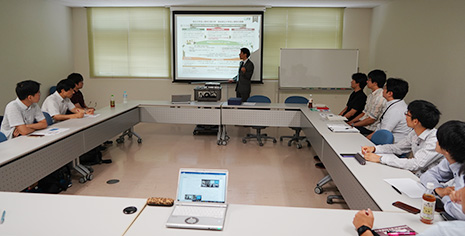
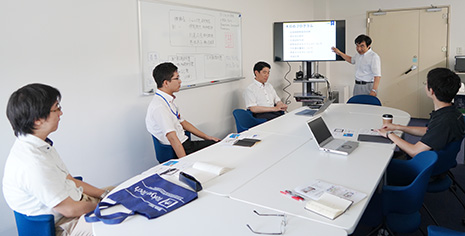
“I would like to explain why Tokyo Tech has established the Comprehensive Academy and why you have been chosen to participate in this program. Tokyo Tech has been selected as a designated national university corporation in reflection of its core role in education and research, as well as its large contribution to society. Our goals for research are to strengthen governance, introduce research funds from outside the university, and ultimately to return funding to basic research. We have also identified three priority areas and three strategic areas that we aim to enhance as Tokyo Tech's key strengths, and further we have established the Laboratory for Design of Social Innovation in Global Networks to facilitate the integration of scientific and technological advances into society. As an element of these broader movements, the Organization for Fundamental Research (CFR) was formed to foster early-career scientists who will be active at the forefront of the global research.
A survey by the Ministry of Education, Culture, Sports, Science and Technology (MEXT) in 2014 reported that assistant professors in Japan are only able to devote 60% of their time to research activities. In order to increase this number to 90%, the Specialized Academies are investing in people, funding, and facilities so that members can immerse themselves in basic research. The Comprehensive Academy is a short-term, three-month program that we also hope provides an opportunity for you to devote 90% of you time to seriously consider your future research directions. For this reason, we have decided to keep the activities of the Comprehensive Academy to a minimum and give you space for intellectual creativity. We strongly encourage you to participate in activities of the Academy, which have been designed to facilitate reflection on research questions. About two weeks ago at the opening ceremony of the CFR, we held a press conference which was covered by the Nikkei Business Daily and the Science Daily. I and all the staff will support you over the coming three months of this enjoyable program so that you can think about your future research themes. Please take pride in being a member of the Comprehensive Academy and work hard to improve your skills.
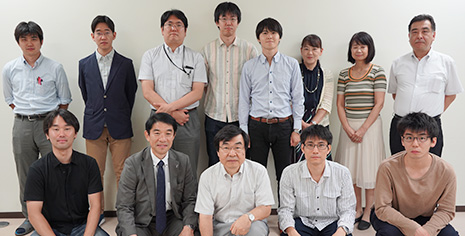
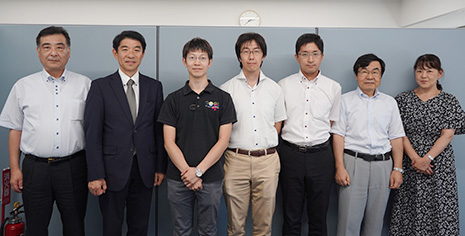
2019-8-6 & 9
Final Presentation of 2019 First-Term Comprehensive Academy Member Research Projects.
The 14 members of the 2019 first-term comprehensive academy were invited to deliver short talks on their research topics in two session in the Teshima Memorial Conference Room in Kuramae Hall, Ookayama (August 6, 2019, from 13:30 to 16:00), or the 719 Conference Room in the W9 building, Ookayama (10:50 to 15:30, August 9, 2019). Each academy member gave a 10-minute presentation on the research concepts developed during the academy program, and a 10-minute Q&A session followed each presentation. Members were instructed to make their talks as easy to understand for those who were not familiar with their particular specialty. Most presenters described how they had developed on ideas that they formulated during Academy activities, such as those inspired by other members’ research outlined at the "Research Project Introduction" session, those taking on a future-oriented perspective drawing on discussions at the "Connecting Your Research with Tomorrow’s Society" session, and those stimulated by Dr. Ohsumi's advice at the Special Lecture session. Most of the 65 questions posed during the Q&A session built on the mutual interests developed during the program, and the presenters’ responses showed additional depth and clarity following the three months of reflection and idea exchange. It was clear from the active participation of all involved that a strong enthusiasm for integrating different disciplines and proactively adopting new ideas was a key outcome of the comprehensive academy. We hope that the research plans of each academy member will be further refined through discussions with colleagues in their respective fields of expertise, and will come to fruition through collaboration with scientists from diverse backgrounds. After the presentation session, a certificate awarding ceremony was held, which was the last event for the members of the first-term class of the Academy. The Final Presentation session will also be held for the second-term class of 2019 (those selected for the September-November program).


2019-7-31
Comprehensive Academy Class of 2019 Special Event: Getting to Know Prof. Ohsumi.
The Comprehensive Academy held a special lecture, “Getting to Know Prof. Ohsumi”. on July 31, 2019, from 16:00 to 18:00. The special event program provides young researchers with an opportunity to hear from a world-renowned scientist about his or her own life and research history, the scientist’s advice for young researchers, and other topics that are not usually available at a conventional talk session.
This year, we invited Professor Emeritus Yoshinori Ohsumi, who was awarded the Nobel Prize in Physiology or Medicine in 2016, to deliver the lecture. 26 out of 29 2019 academy members participated in this Special Lecture, except for three who were unable to attend due to business trips or other unavoidable reasons. In his talk, Dr. Ohsumi provided an engaging outline of his career that included a wealth of valuable information for budding researchers. During the Q&A session after the talk, Dr. Ohsumi took time to answer all of the many and various questions from academy members one by one, with his advice leaving a lasting impression. Afterwards, at a social gathering held for the occasion, participants continued to engage in discussion. Dr. Ohsumi was always surrounded by young scientists and enjoyed the robust conversation until the end of the night.


Here are just two couple of the many messages provided by Dr. Ohsumi:
1. There are many interesting research topics, but you must choose to focus on what is most important and interesting to you. No matter how busy your life as a researcher becomes, you must keep these interests alive. Also, be aware of the ultimate goal of your research and the level of understanding that you desire as a researcher.
2. In Japan, there is a lot of pressure to become an expert as soon as possible, so there are few opportunities to gain the range of experience that is required for a deep understanding of science. Overseas, the opportunity to come into contact with people from a wide variety of backgrounds and with a range of experiences is a daily occurrence, which offers allows researchers to develop through interaction with such people. Develop your fundamental communication skills as a scientist so that you may interact with as wide a variety of people as possible.

2019-7-18
“Connecting Your Research with Tomorrow’s Society" workshop held for the first-term 2019 Comprehensive Academy Members.
First-term academy members took part in the workshop, which was held on the 4th floor of the Centennial Hall on the Ookayama Campus between 1:30 pm to 5:30 pm on July 18, 2019 in collaboration with the Laboratory for Design of Social Innovation in Global Networks (D-Lab) and the Organization for Fundamental Research. By providing comprehensive academy members with an opportunity to step back and conduct a broad overview of their research project, this program encourages participants to achieve a new awareness of the connection between their research and the future needs of society. Through a group project in which members discuss and imagine future social scenarios, the ability of researchers to adopt a collaborative and macroscopic perspective in their work, as well as communication and collaboration skills, were strengthened.
The workshop proceeded as follows. After a brief introduction by Prof. Ohtake, Headmaster of the Academy and Ms. Takahashi, Group Leader of the D-Lab, three groups were formed to discuss the topics “extremes,” “occupation and industry,” or “education and university”. Fifteen academy members and three facilitators participated in groups dealing with the theme of their choice. Each group shared information and exchanged ideas incorporating the dozens of future-relevant factors that were discussed in previous workshops before using these factors to devise up to three future scenarios using the KJ method. At the conclusion of the session, each group presented a total of six future scenarios to all participants, who were then invited to ask questions and exchange opinions through discussion. Members were finally given an assignment to further analyze the future scenarios identified by their group, and to adopt a macroscopic perspective to examine how their own research field would integrate with such a future society. Members submitted a report on this a week later.
While members, who did not learn about the nature of the workshop until the day, were initially reserved, they went into full throttle once the activities begun and had open and vigorous discussions. Upon the conclusion of the workshop, a social event was held for participants, where they further bonded as a group. This workshop will also be held for the second-term class of 2019 (those selected for the September-November program).



2019-7-1
Researcher Presentations for the First-term Comprehensive Academy Class of 2019.
On July 1, 2019, from 10:00 am to 4:30 pm, 16 academy members in the first-term (June to August) class of 2019 were invited to give presentations on their research fields at the Tejima Memorial Conference Room in Kuramae Hall, Ookayama Campus. In this session, each academy member gave a 7-minute presentation about their past research to the interdisciplinary membership of the academy, followed by a 12-minute question-and-answer session, to deepen communication and learn about each other's research. Interdisciplinary communication is difficult for speakers as it can be challenging to introduce research interests and opinions to a non-specialist audience. The audience, too, must engage with and understand the speaker's thoughts and specialist knowledge before they are able to voice an opinion about the work. Thanks to the careful preparation of speakers and engagement of all members as an audience, a total of 89 questions and answers were actively debated, and members were able to share their valuable experiences, often from a unique and valuable perspective, with each other. This session will also be held for the second-term class of 2019 (those selected for September-November program).
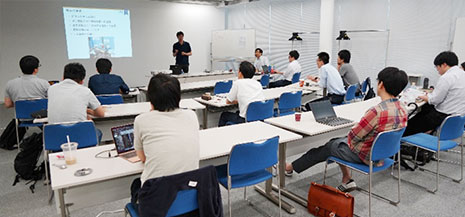
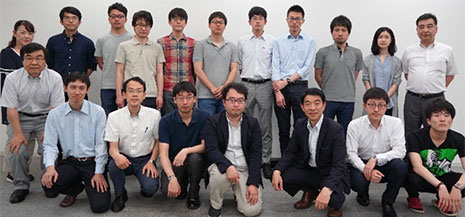
2019-6-27
The 3rd Specialized Academy for Cell Science Meeting
The 3rd Specialized Academy for Cell Science meeting was held on June 27th.
Title: Every cloud has a silver lining
Speaker: Prof. Hiroshi Iwasaki (Cell Biology Center, Institute of Innovative Research)
Prof. Hiroshi Iwasaki of the Cell Biology Center gave a talk entitled “Every cloud has a silver lining.” Prof. Iwasaki described the starting point of his research, drawing inspiration from the beauty of DNA replication in E. coli. Throughout his research career at Osaka University (Research Institute for Microbial Diseases), Yale University, Yokohama City University, and the Tokyo Institute of Technology, he devoted himself to understanding the functions of Umu, Ruv, Din, and other factors involved in DNA replication and repair. He is a leader in the field of DNA replication and repair and explains his approach with the slogan "From Genetics to Dynamics".
“Curiosity should be the main driving force in science“ he said, adding that “Rebelling against my boss and rival researchers was a critical driving force in my work.” He emphasized that “Unexpected data are the most important. They are the key to unlocking a new world in your research.” Prof. Iwasaki’s honest retelling of his experiences offered many important lessons for young researchers.
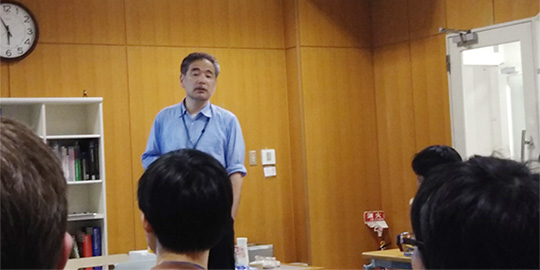
2019-6-24
Orientation for the Comprehensive Academy’s First-term Class of 2019.
Orientation sessions for first-term academy members of the class of 2019 were held on June 13, 2019 at the Teshima Memorial Conference Room, Kuramae Hall, Ookayama Campus, and on the following day at the Director's Conference Room, S2 Building, Suzukakedai Campus. Of the 16 academy members, 12 attended the Ookayama session and four the Suzukakedai session. In addition to receiving their induction certificates, the orientation program included the following activities:
- ・Self-introductions by the staff of the academy
- ・An explanation of the agenda by Associate Director Ino
- ・An outline of the purpose and activities of the Comprehensive Academy by Headmaster Ohtake
- ・A self-introduction session for all academy members
- ・The presentation of admission certificates by Headmaster Ohtake
- ・Signing of a pledge
- ・A talk about effective presentation methods by Associate Director Ino
- ・An introduction to academy events held outside the training period
- ・A Q&A session
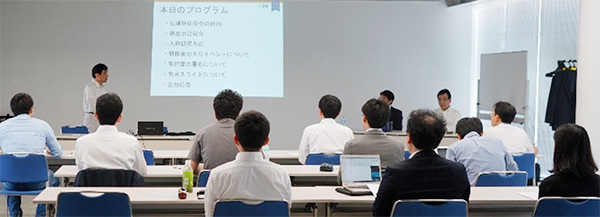
Ookayama Campus
Headmaster Ohtake delivered a talk that described the background to the Comprehensive Academy: :
“I would like to explain why Tokyo Tech has established the Comprehensive Academy and why you have been chosen to participate in this program. Tokyo Tech has been selected as a designated national university corporation in reflection of its core role in education and research, as well as its large contribution to society. Our goals for research are to strengthen governance, introduce research funds from outside the university, and ultimately to return funding to basic research. We have also identified three priority areas and three strategic areas that we aim to enhance as Tokyo Tech's key strengths, and further we have established the Laboratory for Design of Social Innovation in Global Networks to facilitate the integration of scientific and technological advances into society. As an element of these broader movements, the Organization for Fundamental Research (CFR) was formed to foster early-career scientists who will be active at the forefront of the global research.
A survey by the Ministry of Education, Culture, Sports, Science and Technology (MEXT) in 2014 reported that assistant professors in Japan are only able to devote 60% of their time to research activities. In order to increase this number to 90%, the Specialized Academies are investing in people, funding, and facilities so that members can immerse themselves in basic research. The Comprehensive Academy is a short-term, three-month program that we also hope provides an opportunity for you to devote 90% of you time to seriously consider your future research directions. For this reason, we have decided to keep the activities of the Comprehensive Academy to a minimum and give you space for intellectual creativity. We strongly encourage you to participate in activities of the Academy, which have been designed to facilitate reflection on research questions. About two weeks ago at the opening ceremony of the CFR, we held a press conference which was covered by the Nikkei Business Daily and the Science Daily. Reporters asked me at there, “how will you evaluate the effectiveness of the academies?” From the perspective of fostering young researchers, paper publication needs to be included in ongoing evaluations, but as I said at the time, “I believe that it is necessary for young researchers to take on challenging and unique research projects, and we want to see researchers challenging different fields and incorporating interdisciplinary approaches in their work.”
I and all the staff will support you over the coming three months of this enjoyable program so that you can think about your future research themes. Please take pride in being a member of the Comprehensive Academy and work hard to improve your skills.
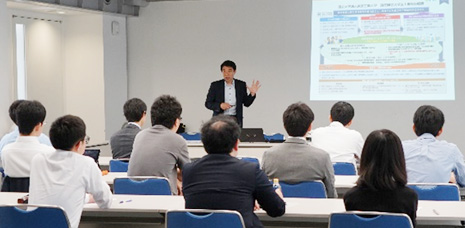
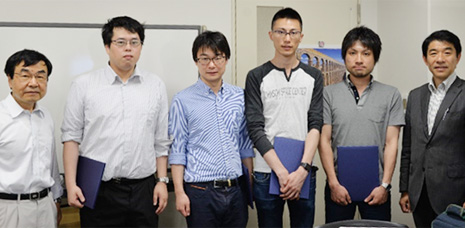
2019-5-27
Seminar hosted by Academy for Quantum Computing
Academy for Quantum Computing hosted a seminar on the quantum bifurcation machine by Dr. Hayato Goto, Senior Researcher of Toshiba. His optimization algorithm attracted much attention from researchers and the media. The seminar counted many participants both from the Institute and the outside active discussions were exchanged among participants.
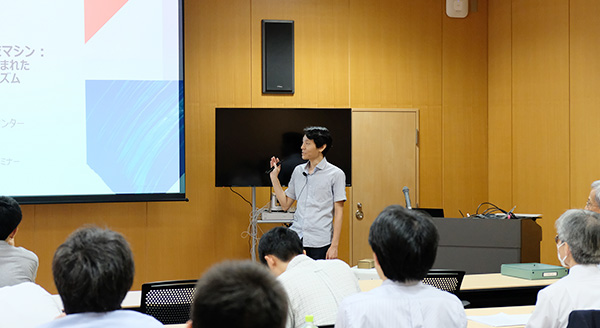
2019-4-22
The 2nd meeting of the Specialized Academy for Cell Science
The 2nd meeting of the Specialized Academy for Cell Science was held on April 22nd.
Title: A life investigating pathways that repair broken chromosomes
Speaker: Prof. Jim E. Haber (Tokyo Tech World Research Hub Initiative)
Dr. Jim E. Haber is a professor and director of the Rosenstiel Basic Medical Sciences Research Center and a specially appointed professor at the Tokyo Institute of Technology World Research Hub Initiative (WRHI). From the dawn of molecular biology to the present day, he has vigorously studied chromosome dynamics and DNA repair in yeast. In this meeting, he described his academic career to young researchers in the Cell Biology Center. He said “Life is like one branch of big tree with many branches. We have to make decisions at several branch points. I taught many students and collaborated with a variety of researchers, and these experiences helped me choose a good pathway.” He also enthusiastically expressed his ambitions for future research.
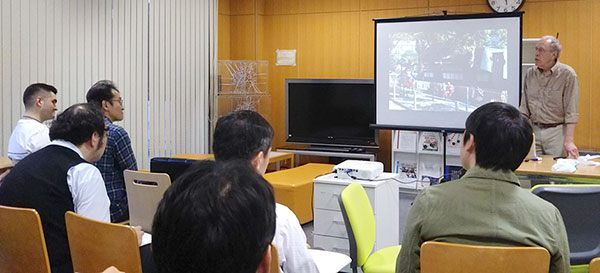
2019-4-12
Seminar at D-Wave Systems,Inc. by Dr. Nishimori, Headmaster
Dr. Hidetoshi Nishimori, Headmaster of Academy for Quantum Computing of Specialized Academies, gave a seminar on quantum computing at D-Wave Systems, Inc. in Burnaby, Canada. D-Wave Systems has developed a device based on the theory proposed by Drs. Kadowaki and Nishimori in 1998. The results of discussions at D-Wave will be influence positively the activities of the members.
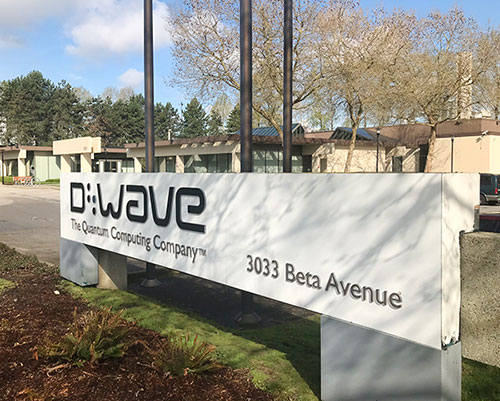
2019-4-4
Presentation of certificates of appointment
A ceremony was held on April 4, 2019 for the presentation of certificates of appointment for members of the Academy for Quantum Computing. Dr. Fumio Koyama, Director of ORF, gave a talk on the role of the Organization for Fundamental Research (CFR), and Dr. Hidetoshi Nishimori, the Headmaster, handed the certificates to the members with words of encouragement.
From left to right, are , Dr. Fumio Koyama, Director of ORF, Dr. Hidetoshi Nishimori, Headmaster of Academy for quantum computing, Dr. Patrick Koh (Academy member), Dr. Yuki Bando (Academy member), and Specially Appointed Associate professor Kazutaka Takahashi (Facilitator)
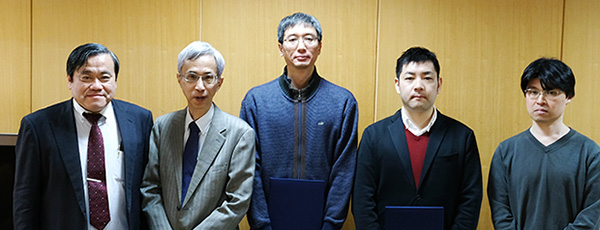
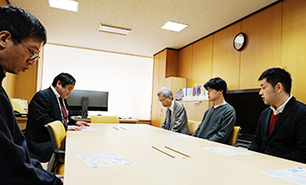
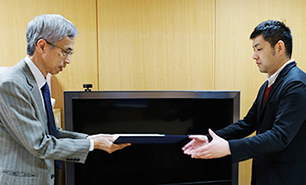
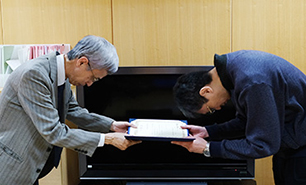
2019-4-1
Appointment of New Academy Scholars
Three new Academy Scholars were inducted into the Specialized Academy for Cell Science of the Organization for Fundamental Research. Each scholar was presented with a certification of induction by Academy Head Yoshinori Ohsumi and Organization Director Fumio Koyama.
The three inductees are Specially Appointed Assistant Professor Akinori Yamasaki, Specially Appointed Assistant Professor Takeshi Nakamura and Specially Appointed Assistant Professor Takashi Matsuda.
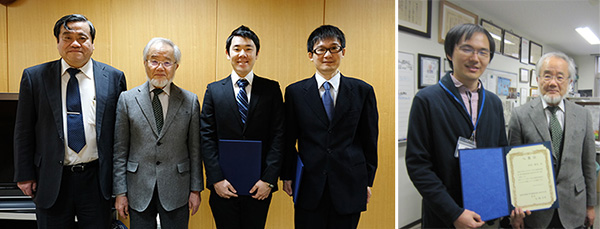
2019-3-25
Cell Biology Center Exchange Meeting – the 1st Specialized Academy for Cell Science meeting
An exchange meeting for Cell Biology Center researchers and the 1st Specialized Academy for Cell Science meeting were held on March 25th.
| Cell Biology Center Exchange Meeting | Title:Title: Autophagy, muscle cell, and beyond Speaker: Associated Prof. Naonobu Fujita (Cell Biology Center) |
|---|---|
| The 1st Specialized Academy for Cell Science Meeting | Title: My history as a researcher: the joy of research Speaker: Academy Head Yoshinori Ohsumi |

In this newly-established series of specialized academy meetings, established scientists will talk about their careers as researchers and advice for young scientists in a casual setting.
The 1st speaker was Academy Head Professor Yoshinori Ohsumi. He described how he discovered autophagy and become a pioneer in his field of research: “I enjoy taking on research that is both interesting and difficult to understand logically.” He also recommended that researchers “keep simple and universal scientific questions” foremost in mind when conducting research. Part of the success of his field is thanks to the many researchers in his group. He commented “It is important to generate interest amongst colleagues by describing your research in an easy to understand manner.”
2019-3-12
Tetsuya Handa published a paper (co-authored)
Tetsuya Handa, a member of the Specialized Academy for Cell Science, published a co-authored paper entitled “Signs of biological activities of 28,000-year-old mammoth nuclei in mouse oocytes visualized by live-cell imaging.” The methods described in the paper open new doors in the field of paleontological science. This paper is the result of joint research by the Faculty of Biology-Oriented Science and Technology, Kindai University, the Institute of Advanced Technology, Kindai University, the Sakha (Yakutia) Republic Academy of Sciences in the Russian Federation, Tokyo University of Agriculture, the Tokyo Institute of Technology, and the National Institute for Environmental Studies. The paper was published in the British scientific journal Scientific Reports.
2019-3-1
Assistant Professor Hidenori Nishihara wins Best Paper Award
Assistant Professor Hidenori Nishihara (Specialized Academy for Cell Science) presented his paper at the 90th Annual Meeting of the Genetics Society of Japan last year and was chosen to receive the Best Paper Award.
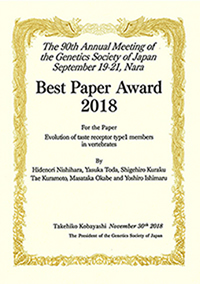
2018-12-11
A world-first method for single cell epigenome analysis
A chromatin-integration labeling (ChIL) method that can acquire epigenomic information using a very small number of cells has been developed by a collaboration between groups at the Medical Institute of Bioregulation, Kyushu University (Professor Yasuyuki Ohkawa, Assistant Professor Akihito Harada, and Assistant Professor Kazumitsu Maehara), the Cell Biology Center, Tokyo Institute of Technology (Professor Hiroshi Kimura and Specially Appointed Assistant Professor Tetsuya Handa), and the Institute for Quantitative Biosciences, University of Tokyo (Professor Hitoshi Kurumizaka, Specially Appointed Assistant Professor Yasuhiro Arimura, and Professor Katsuhiko Shirahige).
for more info
2018-11-22
Four Academy Scholars Deliver Talks at the “3R&3C Symposium”
Four academy scholars from the Organization for Fundamental Research presented on their research at the "3R&3C Symposium" which ran from the 12th-16th of November.
- Assistant Professor Hideo Tsubouchi
"Synergistic Activation of Dmc1 by the Sfr1-Swi5 and Meu13-Mcp7 Complexes" - Specially Appointed Assistant Professor Takahisa Maki
"H3K4 methyltransferase Set1C plays a role in donor preference of mating-type switching in Schizosaccharomyces pombe" - Specially Appointed Assistant Professor Argunhan Bilge
"Rad51 Interaction Analysis Reveals a Functional Interplay Among Recombination Auxiliary Factors" - Specially Appointed Assistant Professor Tetsuya Handa
"A chromatin integration labeling method enables epigenomic profiling with lower input"
2018-10-15
Induction Ceremony Held for the Specialized Academy for Cell Science of the Organization for Fundamental Research
An induction ceremony for the Specialized Academy of Cell Science of the Organization for Fundamental Research (CFR) was held on the 25th of October, 2018, at the S2 building of Suzukakedai campus.
In addition to Fumio Koyama, the Director of the CFR, and Yoshinori Ohsumi, the Head of the Academy, over 100 participants attended the event, including Academy inductees and students.


The event began with remarks from Director Koyama, who noted: “As a result of Prof. Ohsumi’s continued advocacy for fundamental research, this year we launched the CFR with the support of the Ministry of Education, Culture, Sports, Science and Technology (MEXT). While it’s difficult to anticipate how to spur innovation, the CFR is designed to provide early-career researchers with an opportunity to conduct focused study. I’m pleased to note that many post-graduate students are in attendance today, and urge you to join us in proceedings today in the capacity of potential future inductees.”
Next, Deputy CFR Director Naoto Ohtake delivered a presentation describing the CFR. He explained:
“The CFR has been funded for the four years between 2018 and April 2022 by MEXT. I hope that current postgraduate students will take part in this program in the future. Today, we will be inducting 13 researchers into the CFR Specialized Academy for Cell Science, and next year will see the establishment of another Specialized Academy led by Hidetoshi Nishimori. The CFR was specifically cited in Tokyo Institute of Technology’s successful application for Designated National University Corporation status, which was granted this year.”


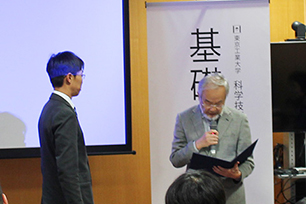
Following an overview of the background and organization of the CFR, Academy Head Prof. Ohsumi provided words of encouragement to inducted academy scholars and provided each with a certificate of induction. Prof. Ohsumi said: “I would like for the CFR to be thought of as one way in which Tokyo Tech is strengthening its research capabilities. Take heart in the fact that resources have been provided to you in the fiercely competitive world of research. I hope that everyone will get involved to create an unconstrained research environment for young researchers.”
Following the induction ceremony, Deputy Head of the Specialized Academy for Cell Science, Hiroshi Iwasaki, led attendees on a tour of the newly furnished Open Laboratory, which was set up on the 2nd floor of the S2 building on the occasion of the Academy’s establishment.
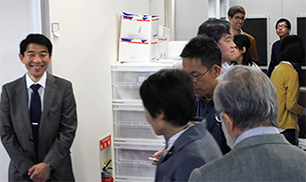
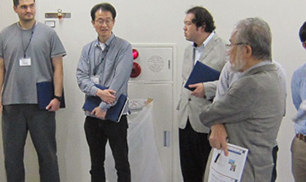
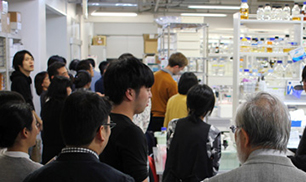
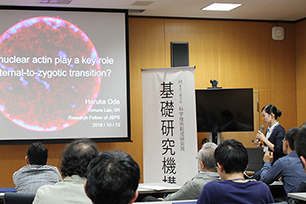
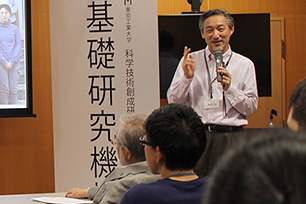
After this, the 1st CFR Seminar was held, with Prof. Horoshi Kimura delivering a talk entitled “Imaging Chromatin and Translation in Living Cells,” and Dr. Haruka Oda, a researcher in the Kimura lab, presenting on “Intranuclear Actin during Early Embryogenesis”.
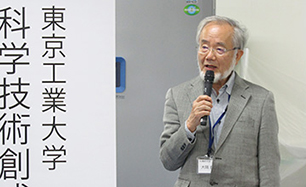
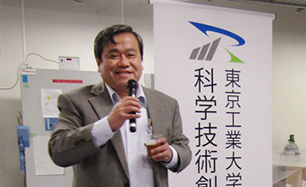

Finally, a social event attended by over 100 participants was held after the seminar. Academy Head Ohsumi freely mingled and chatted with attendees, with both the seminar and party concluding with great success.
2018-07-06
Organization for Fundamental Research was established.
>2018.7~2019 News | >2020~2021 News | >2022~2023 News | >Latest News

